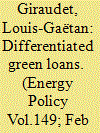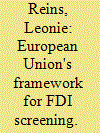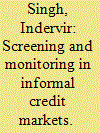| Srl | Item |
| 1 |
ID:
177379


|
|
|
|
|
| Summary/Abstract |
Scaling up home energy retrofits requires that associated loans be priced efficiently. Using a unique dataset of posted loan prices scraped from online simulators made available by French credit institutions, we examine the differentiation of interest rates in relation to project risk. Crucially, our data are immune from sorting bias based on borrower characteristics. We find that greener, arguably less risky, automobile projects carry lower interest rates, but greener home retrofits do not. On the other hand, conventional automobiles carry lower interest rates than do conventional home retrofits, despite arguably similar risk. Our results are robust to a range of robustness checks, including placebo tests. They together suggest that lenders use underlying assets to screen borrower's unobserved willingness to pay, which can cause under-investment in home energy retrofits. We thereby point to a new form of the energy efficiency gap. This has important policy implications in that it can explain low uptake of zero-interest green loan programs.
|
|
|
|
|
|
|
|
|
|
|
|
|
|
|
|
| 2 |
ID:
166439


|
|
|
|
|
| Summary/Abstract |
The European Commission recently released a proposal for a Regulation establishing a framework for screening of foreign investment into the European Union. The proposal aims at introducing a harmonized regulatory framework for the screening of foreign direct investments by Member States on grounds of security or public order, amongst others in the energy sector. The proposal seems to be catered towards deference for Member States, but considering the large amount of EU funding involved, as well as the applicability of EU legislation, in practice many projects will fall under the new screening competence of the Commission. Even though the Commission, according to the proposal, may only give an opinion, it appears to turn the energy competence ever more towards Brussels. This paper aims at determining how the screening mechanism should be seen in light of EU competences in the area of investment and energy. Is this an example of “mission creep” on the part of the Commission? Does this infringe Article 194 TFEU which guarantees the Member States' “right to determine the conditions for exploiting its energy resources, its choice between different energy sources and the general structure of its energy supply”? Or is this justified and needed action on the basis of the Article 170 TFEU on trans-European networks in the area of energy infrastructure?
|
|
|
|
|
|
|
|
|
|
|
|
|
|
|
|
| 3 |
ID:
187135


|
|
|
|
|
| Summary/Abstract |
The present article examines the screening and monitoring strategies used by lenders to solve the problem of imperfect information in the rural informal credit market. The study uses data from a primary survey conducted in Punjab, India. The survey focuses on informal lending between commission agents and farmers. Data were collected from 120 randomly selected commission agents from four blocks. Each of the blocks represents a different development level. The results show that commission agents invested significant time and resources for screening and monitoring the farmers. The screening and monitoring were found to be more stringent in areas that were underdeveloped and had higher default risk. Commission agents could shift a significant share of the screening cost to the borrowers, thereby increasing their self-enforcement range. The study argues that high screening cost hurts small farmers. The regression results found a significant reduction in the default rate and the unrecovered loan due to screening strategies.
|
|
|
|
|
|
|
|
|
|
|
|
|
|
|
|
| 4 |
ID:
105994


|
|
|
|
|
| Publication |
2011.
|
| Summary/Abstract |
A key problem for counterterrorism is how large numbers of individuals can be screened most efficiently to discover terrorists. This question arises at security checkpoints of all kinds, from roadblocks to airline security counters. Some argue that certain categories of individuals, for instance, young Muslim men in the airline context, should be screened more heavily than others. Others deride this as racial profiling, and argue that any such scheme would be easily evaded. I examine a model of searching for terrorists among a population divided into categories that vary in their potential reliability or ease of recruitment as agents of terrorist attacks. The equilibria in the model feature profiling, in that different categories are searched with different intensities. Practical difficulties in implementing a rational profiling scheme are discussed.
|
|
|
|
|
|
|
|
|
|
|
|
|
|
|
|